|
|
|
Sort Order |
|
|
|
Items / Page
|
|
|
|
|
|
|
| Srl | Item |
| 1 |
ID:
177499
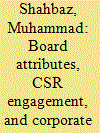

|
|
|
|
|
| Summary/Abstract |
This study provides empirical evidence on the association between board attributes and corporate social responsibility (CSR) engagement—as well as between CSR engagement and corporate performance—in the global energy sector. The data for the period of 2011–2018 was obtained from Thomson Reuters. The results indicate that board diligence and CSR committees are robust drivers of CSR performance, as proxied by the composite environmental, social, and governance (ESG) score along with its three individual indicators. While board independence is more influential in boosting the aggregate ESG score and the governance indicator, the board's gender diversity is more influential in environmental and governance indicators. However, higher CSR performance does not guarantee higher financial performance—as proxied by both market and accounting performance. We provide theoretical and practical implications, to guide regulators and energy firms in ensuring the sustainable development of the sector.
|
|
|
|
|
|
|
|
|
|
|
|
|
|
|
|
| 2 |
ID:
130983
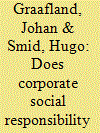

|
|
|
|
|
| Publication |
2014.
|
| Summary/Abstract |
Many studies have been performed to assess the impacts of corporate social responsibility (CSR) on the financial performance of companies. There are, however, very few studies that analyze how CSR policies and instruments affect the realization of social and environmental CSR goals, such as the reduction of workplace accidents or CO2 emissions. Therefore, it remains uncertain to what extent CSR really contributes to sustainable development and whether it can serve as an alternative to government regulation to internalize external effects from market operation. The present study provides an explorative empirical analysis that aims to fill this gap. We employ regression analysis on a sample of 109 Chinese companies. The estimation results show that having a code of conduct stimulates the implementation of other organizational CSR instruments, but CSR implementation only partly affects the realization of CSR goals. Having codes of conduct without implementing CSR does not have a significant impact on societal welfare.
|
|
|
|
|
|
|
|
|
|
|
|
|
|
|
|
| 3 |
ID:
107450
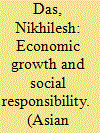

|
|
|
| 4 |
ID:
182973
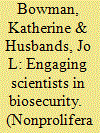

|
|
|
|
|
| Summary/Abstract |
Major efforts to engage scientists in issues of biosecurity in the United States and internationally began in the early 2000s in response to growing concerns about terrorists using weapons of mass destruction and the mailing of anthrax-laced letters in October 2001. This article draws on the literature about the “science of science communication,” including research on framing, to examine the strategies used to try to raise awareness and create support for policies and practices to address public concerns about biosecurity issues within scientific communities. Engagement strategies framed as an inherent part of the broader social responsibilities of the scientific community have shown the promise of being more effective than those framed in terms of legal and regulatory requirements and an emphasis on security alone. The article draws on the case of the InterAcademy Partnership (IAP), the global network of academies of science and medicine, and its relationship with the 1972 Biological and Toxin Weapons Convention (BWC), with additional examples from other national and international scientific organizations.
|
|
|
|
|
|
|
|
|
|
|
|
|
|
|
|
| 5 |
ID:
119949
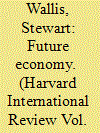

|
|
|
| 6 |
ID:
142667
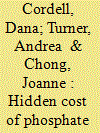

|
|
|
|
|
| Summary/Abstract |
Without phosphorus, we could not produce food. Farmers need access to phosphate fertilizers to achieve the high crop yields needed to feed the world. Yet growing global demand for phosphorus could surpass supply in the coming decades, and the world currently largely relies on non-renewable phosphate rock that is mined in only a few countries. Morocco alone controls 75% of the remaining reserves, including those in the conflict territory of Western Sahara. While some argue that the market will take care of any scarcity, the market price of phosphate fertilizers fails to account for far-ranging negative impacts. Drawing on multi-stakeholder supply chain risk frameworks, the article identifies a range of negative impacts, including the exploitation and displacement of the Saharawi people, the destruction of aquatic ecosystems by nutrient pollution, and jeopardizing future generations' ability to produce food. This paper fills a crucial gap in understanding phosphorus impacts by mapping and discussing the nature of phosphorus supply chain risks, and the transmission of such risks to different stakeholder groups. It also identifies a range of potential interventions to mitigate and manage those risks. In addition, the paper highlights that while risks are diverse, from geopolitical to ecological, those groups adversely affected are also diverse – including the Saharawi people, farmers, businesses, food consumers and the environment. Potential risk mitigation strategies range from resource sparing (using phosphorus more sparingly to extend the life of high quality rock for ourselves and future generations), to resource diversification (sourcing phosphorus from a range of ethical sources to reduce dependence on imported phosphate, as a buffer against supply disruptions, and preferencing those sources with lower societal costs), and sharing the responsibility for these costs and consequences.
|
|
|
|
|
|
|
|
|
|
|
|
|
|
|
|
| 7 |
ID:
087029
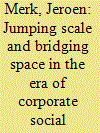

|
|
|
|
|
| Publication |
2009.
|
| Summary/Abstract |
Global outsourcing arrangements in the garment industry, and elsewhere, provide one type of company-brands or retailers-with the possibility of distancing themselves from the organisational questions related to (mass) labour processes. By externalising the labour-intensive aspects of production, global sourcing companies no longer have to take responsibility for the majority of workers involved in the process. This has given these companies an opportunity to break out of unionised and established industrial areas with strict institutionalised labour processes, and has undermined traditional strategies that labour has used to protect itself against exploitation, turning the global supply chain into a barrier to organising and collective bargaining. Spatial strategies are by no means exclusive to firms. Workers too can pursue their causes on a broader socio-geographic terrain, a process often referred to as 'jumping scale' or 'bridging space'. Drawing upon concepts derived from social and labour geography, this paper is a critical inquiry into the nature, possibility and limits to cross-border solidarity campaigns in the global garment industry. The paper starts by emphasising that workers remain active participants in a process of contestation that constantly reshapes the dynamics of workplace control and its accompanying power balances and relations. Then we discuss how the increased attention being paid to working conditions by activists, consumers, journalists and branded corporations adds an extra-local dimension to workplace relations, (potentially) restricting management from exercising more despotic forms of labour relations. The final part discusses how the Clean Clothes Campaign's urgent appeal system provides a grassroots-based system to build labour solidarity across space, which may help to regain leverage over capital.
|
|
|
|
|
|
|
|
|
|
|
|
|
|
|
|
| 8 |
ID:
130982
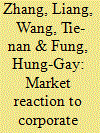

|
|
|
|
|
| Publication |
2014.
|
| Summary/Abstract |
This study uses an event study methodology to examine how the Chinese market reacts to announcements of involvement in corporate social responsibility (CSR) by Southern Weekend (a Chinese newspaper) for Chinese firms from 2008 to 2012. Our results show significant and positive market reactions, supporting the instrumental stakeholder theory. We attribute the positive market response to social capital development and real growth options related to the CSR involvement by the Chinese firms.
|
|
|
|
|
|
|
|
|
|
|
|
|
|
|
|
| 9 |
ID:
118359
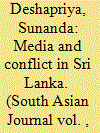

|
|
|
| 10 |
ID:
174337
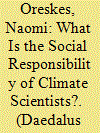

|
|
|
|
|
|
|
|